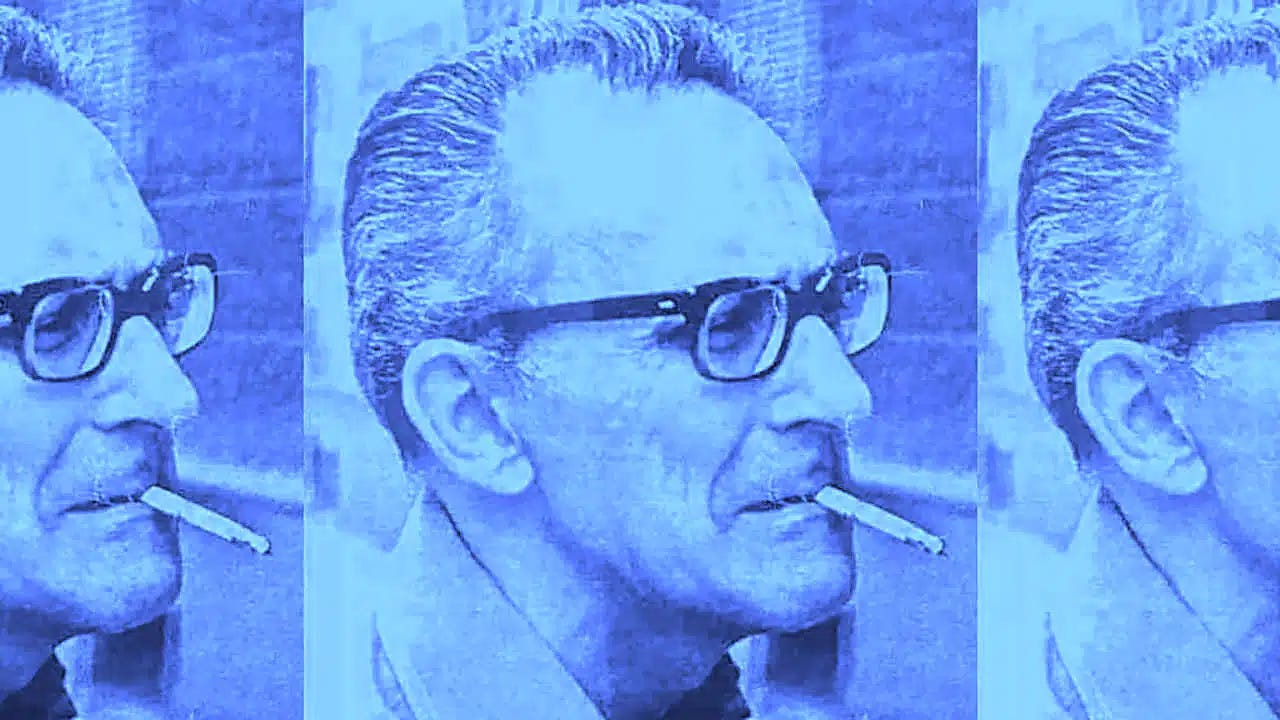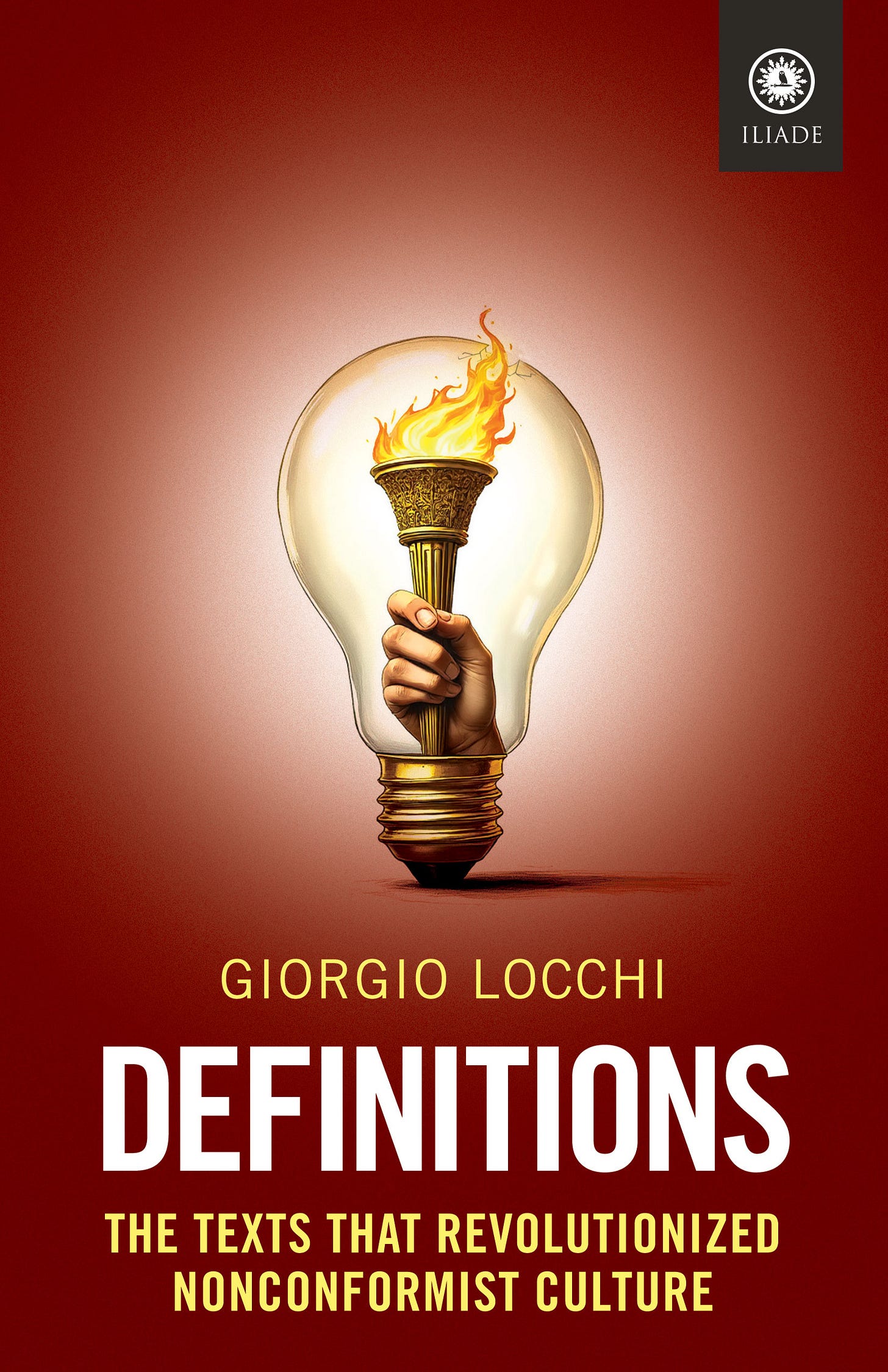Why Giorgio Locchi Matters Today
by Alexander Raynor
“I had only two masters: Friedrich Nietzsche and Giorgio Locchi. The first I never met, the second I did,” wrote the influential French philosopher Guillaume Faye. “I weigh my words carefully: without Giorgio Locchi and his work, the true chain of European identity defense would probably have broken.”
Giorgio Locchi (1923-1992) was an Italian philosopher, journalist, and intellectual who, despite receiving relatively limited recognition during his lifetime, had a profound influence on European cultural and political thought in the latter half of the 20th century. Working primarily from Paris as a foreign correspondent for the Italian newspaper Il Tempo, Locchi developed a sophisticated philosophical system that integrated ideas from Friedrich Nietzsche, Richard Wagner, and Martin Heidegger while making original contributions to our understanding of history, time, and cultural identity.
There are several compelling reasons to read Locchi today:
First, he provides one of the most rigorous and philosophically sophisticated analyses of how different conceptions of time and history shape civilizations. Drawing on Wagner’s musical innovations and Nietzsche’s concept of eternal return, Locchi articulated a “spherical” view of historical time that stands in contrast to both linear progressive and cyclical views. For Locchi, each historical moment contains past, present and future dimensions simultaneously — similar to how a musical piece maintains coherence through the interplay of memory, current notes, and anticipation. This yields profound insights into how cultures understand themselves and their trajectories.
Second, Locchi offers a unique perspective on the relationship between music, myth, and cultural identity. His analysis of Wagner’s operas goes beyond standard interpretations to reveal how music can express fundamental worldviews and shape historical consciousness. He saw in Wagner’s innovative use of leitmotifs and endless melody a way to represent the multidimensional nature of historical time. This connects to his broader argument about how myths and cultural narratives structure how societies understand themselves and their destiny.
Third, Locchi developed an original theory about how historical tendencies emerge and evolve through distinct mythic, ideological, and synthetic phases. This provides a useful framework for understanding cultural and political movements. He argued that new historical tendencies first appear in mythic form, then split into competing ideologies, before potentially achieving a synthetic resolution. This helps explain patterns we see in how movements develop and transform over time.
The core of Locchi’s thought deals with how societies and cultures maintain coherence and identity through time. He saw that different civilizations are shaped by distinct “tendencies” — deep patterns of thought and feeling that structure how they view the world and their place in history. These tendencies aren’t just abstract ideas but express themselves through art, ritual, politics and social organization.
A key insight was his recognition that tendencies go through distinct phases. In the mythic phase, a tendency expresses itself through powerful symbols and narratives that unite opposites in an original vision. In the ideological phase, this unity breaks down into competing interpretations. In the synthetic phase, these conflicts may be resolved in a new unity — though this isn’t guaranteed.
Locchi was particularly interested in how European civilization contained competing tendencies — one expressed in Christianity and modern egalitarianism, the other in various attempts to revive older European traditions and values. He saw Wagner as a crucial figure who achieved a new mythic expression that could potentially regenerate European culture — the suprahumanist myth.1
This connects to another important aspect of Locchi’s thought — his analysis of how societies maintain cultural continuity while also evolving and transforming. He emphasized that healthy cultures need both memory of origins and openness to the future. His concept of spherical time helps explain how this is possible — the past isn’t simply gone but remains active in how we understand ourselves and our possibilities.
Locchi’s work rewards careful study because he combines philosophical rigor with sensitivity to art, myth and culture. While his writing can be dense and challenging, he illuminates fundamental questions about how societies maintain coherence and identity through time. His insights about the relationship between music, myth and historical consciousness remain highly relevant.
Of particular value is Locchi’s understanding of how new cultural and political movements emerge and develop. His analysis of the mythic-ideological-synthetic pattern helps explain both how movements gain initial momentum through powerful founding visions, and how they can later fragment and potentially transform. This framework remains useful for understanding contemporary cultural and political dynamics.
Locchi also offers important insights about the role of art and culture in shaping historical consciousness. His analysis of Wagner shows how artistic innovations can express and help bring about new ways of understanding time and history. This suggests the continuing importance of art and culture in shaping how societies view themselves and their possibilities.
Reading Locchi today is valuable because he addresses fundamental questions about cultural identity and historical consciousness that remain pressing. How do societies maintain continuity while evolving? How do different conceptions of time shape how cultures understand themselves? What role do art and myth play in structuring historical understanding? His sophisticated treatment of these issues provides conceptual resources for addressing contemporary challenges.
While some aspects of Locchi’s thought are products of his historical context, his core insights about the relationship between time, identity and culture remain highly relevant. His analysis of how tendencies emerge and evolve helps illuminate current cultural and political dynamics. His emphasis on the importance of both rootedness and openness to the future speaks to ongoing debates about tradition and change.
Locchi’s work is also valuable because it brings together multiple intellectual traditions in original ways. His synthesis of insights from music, philosophy, and cultural analysis demonstrates the value of cross-disciplinary thinking. While his writing can be demanding, the depth and sophistication of his thought rewards careful study.
To understand Locchi, it’s helpful to start with his more accessible works, like Definitions, before tackling his denser philosophical texts. His analysis of Wagner provides a good entry point to his broader ideas about time, myth and cultural identity. While not all readers will agree with his conclusions, his rigorous treatment of fundamental questions about how societies maintain coherence through time remains valuable.
In conclusion, Giorgio Locchi merits renewed attention as a profound thinker who illuminates crucial questions about cultural identity, historical consciousness, and social transformation. His sophisticated analysis of time, myth and tendency offers conceptual resources for understanding both past and present. While his work can be challenging, it rewards careful study by anyone interested in questions of cultural continuity and change. His insights about how societies maintain coherence while evolving remain highly relevant to contemporary debates.
Order Giorgio Locchi’s Definitions here.
The idea of the suprahumanist myth is explored in Locchi’s other major work: Nietzsche, Wagner e il mito sovrumanista (Nietzsche, Wagner and the Suprahumanist Myth). To better understand this concept, you can check out an interview Éléments conducted with Giorgio’s son, Pierluigi Locchi. The English translation of this interview can be found here.




